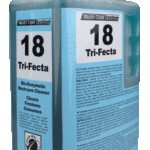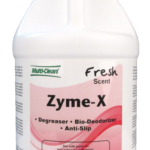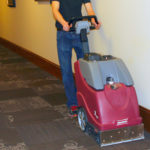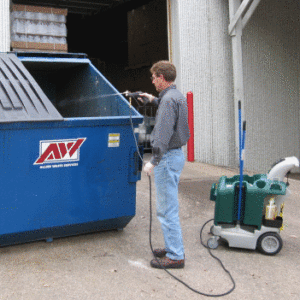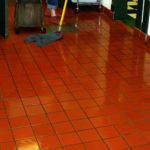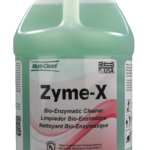How to use Bio Enzyme Cleaning Products to Solve Problems
Bio-Enzyme Cleaning products often collectively referred to as “Enzyme Cleaners” offer a number of benefits in addressing some of the most difficult cleaning challenges. This article addresses how and where to use bio-enzyme products for best results.
Using Nature to Clean
The biological decomposition of all organic compounds is accomplished by naturally occurring bacteria. These bacteria do their job somewhat inefficiently and the process tends to create foul smelling by-products (rotting food, urine, feces, etc). But, what if we could harness the natural process of bacterial decomposition to degrade wastes efficiently without those nasty smelling by products? The answer is we can with a growing number of Bio-Enzyme cleaning products that harness the power of good bacteria to assist in the cleaning and odor mitigation process. This is a natural and a very GREEN process.
bacteria do their job somewhat inefficiently and the process tends to create foul smelling by-products (rotting food, urine, feces, etc). But, what if we could harness the natural process of bacterial decomposition to degrade wastes efficiently without those nasty smelling by products? The answer is we can with a growing number of Bio-Enzyme cleaning products that harness the power of good bacteria to assist in the cleaning and odor mitigation process. This is a natural and a very GREEN process.
What Are Bio-Enzyme Cleaning Products and How do they Work?
Bio enzyme cleaners are cleaning products that use non-pathogenic, “good” bacteria to digest wastes, soils, stains and malodors. The bacteria do this by producing chemicals called enzymes that break down certain molecules (wastes/soils) into smaller pieces. These smaller pieces become “food” for the bacteria. The bacteria consume these soils and break them down into two basic compounds: carbon dioxide and water. The bacteria grow in number and continue to consume the waste until their food supply diminishes (the waste is gone).
An example how enzymes work can be found in the digestion process, human saliva contains enzymes that start the process of breaking down food as the first part of the digestion process. By the time one swallows, those enzymes have already started breaking down food.
When a specific soil is known such as cooking oil/grease, a cleaner can also be formulated with a specific enzyme known to break down grease. These type of kitchen degreasers can be as effective as more hazardous corrosive degreasers. They also can have a residual effect by continuing to break down grease after cleaning is completed.
Where do I use Bio Enzyme Cleaning Products?
Restrooms represent the biggest source of cleanliness complaints and more often than not, the complaints are related to odors. Restroom cleaners fortified with beneficial enzyme producing bacteria can be highly effective at mitigating restroom odors, especially urine odors.
- Hard surfaces including doors, walls, partitions, trash receptacles, countertops, and fixtures.
- Toilets and Urinals especially around the base directly underneath urinals. TIP: After cleaning/mopping with a bio-enzyme product, spray additional bio-enzyme product around trouble areas and allow to air dry.
- Flooring: Most restrooms are grouted tile flooring and the porous grout is a great
hiding place for odor causing bacteria. Regularly mopping the floor with a bio-enyzme product can make persistent urine and other odors go away.
Cleaning Equipment and Tools: Scrubber/extractor recovery tanks, mop, buckets and other cleaning tools can develop a variety of bacterial mal-odors that cause deterioration of equipment.
- Mops: After rinsing dirty mops, spray or dip mop in a bio-enzyme solution and hang up to dry.
- Buckets: Rinse buckets with bio-enyzme products.
- Scrubbers: Regular using a bio-enzyme floor cleaner in a scrubber helps keep scrubber tanks clean and smelling good.
- Extractors: Using a bio-enzyme extraction cleaner helps keep the recovery tanks clean and odor free.
Carpet and Upholstery: The absorbent nature of carpets and upholstery allow them to not only trap odors, but makes a great breeding ground for odor causing bacteria to thrive. This can become a very challenging problem in healthcare, nursing homes, health clubs, assisted living facilities, vet clinics, pet boarding, pet friendly 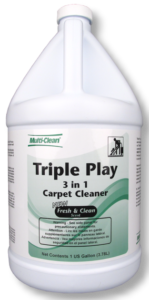 hotels and apartment buildings.
hotels and apartment buildings.
- Urine Accidents penetrate carpet fibers, backing, and subfloors.
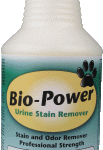
- Other Bio-logical stains/odors incl sweat, feces, vomit, food, dairy
- Carpeted Floors If you smell “Wet dog odor” after extraction you have simply activated odor causing bacteria in the carpet.
Garbage and Dumpsters: Garbage collection areas, trash compactors, and outdoor dumpsters are a common source of odors that can be addressed with bio-enzyme products. Regularly applying a bio-enzyme product into the dumpster, trash bins, or compactors can help, but also outside and particularly underneath can help address foul odors.
Trash Chutes: Common to high rise apartments and condos, trash chutes are a convenient way to for residents to dispose of trash. But they can quickly become disgusting and create odors that almost certainly will lead to resident complaints.
Using a Bio-Enzyme product to manually or automatically spray into the trash chute will help mitigate odors caused by waste food and other trash.
Grease Traps are used by restaurants and food service operations to separate cooking oils/greases to prevent discharge to sanitary sewers. These traps have to be pumped out regularly as they become full of waste grease. Using a bio-enzyme treatment for grease traps prevents excessive build up and odor in grease traps. The reduced buildups mean pumping the trap can be done less frequently.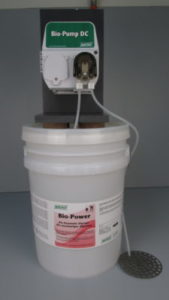
Drain Lines
In food service, grocery, and processing operations, food waste that goes down drains creates a problem. First, odors from rotting food in drains is unsanitary, second, a build up of waste in drains slows and can eventually plug drains, third insects like fruit flies use drains as breeding grounds. By treating drain lines regularly with a bio-enzyme product, one can expect less drain build up, reduced/no drain odors, and less fruit flies and other insects.
Portable Toilets, Septic Systems, RV Waste Tanks: Any type of waste holding tank designed to hold human waste is going to represent a challenge to control odors. Further, Septic Systems depend on bacteria to function, so adding good bacteria to any of these systems are going to help with odors and help prevent the build up of solids in the tanks.
Kitchen Floors
Kitchen floors can become dangerously slippery as grease builds up on the surface. The old way to clean kitchen floors was using a caustic degreaser. Now, a bio-enzyme degreaser can safely break down kitchen grease during cleaning. But it can continue to work breakding down grease even after the cleaning is complete, making floors inherently safer. Better yet, the residual enzyme cleaner helps keep drains free of build up and odors. It will also help reduce fruit flies common in the summer months.
Multi-Clean makes a growing line of Bio-Enzymatic Cleaning and Odor Control Products.
To learn more, visit us at multi-clean.com




